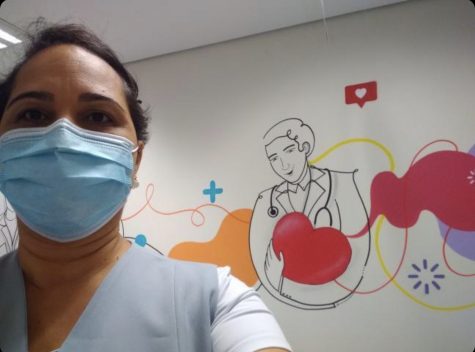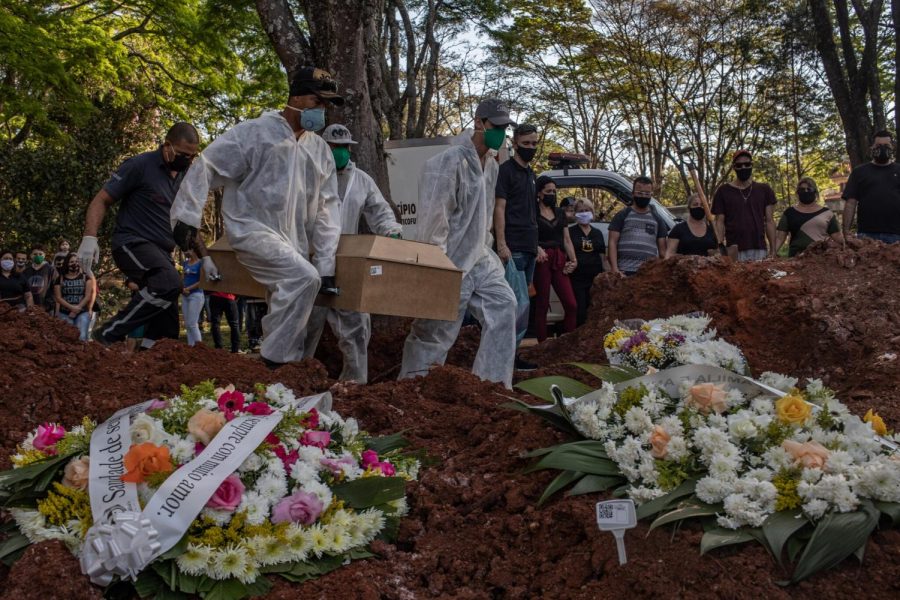Brazil: Global Epicenter of the Pandemic
December 11, 2020
First and third world countries are hand-in-hand, step-in-step when dealing with the coronavirus; although equipped with modern technological and medical advances to rival that of other world nations, the United States has suffered terrible losses and tolls equal to and perhaps surpassing that of Brazil, for instance, considered a developing country in all aspects of the word. The nation, led by independent Jair Bolsonaro, who labeled the virus as a “measly cold” upon its initial growth and recently advised his people to “stop being a country of sissies”, has reported nearly 7 million cases and over 176,000 deaths and continues to present a variety of opinions from state governments and Brazilian residents as it becomes a global epicenter of the pandemic.

Following a rapid spike of cases in May, the government implemented a formal lockdown and enforced preventative measures, effectively encouraging a trend of steadily-decreasing numbers from August to November; this easing of the country’s defenses, however, proved fatal as the death toll once again reached 500 a day and major cities surpassed 80% occupation in hospitals. States’ attempts at reinstituting restrictive measures were met with a resistant governmental reaction. Bolsonaro, who contracted the virus in July and eagerly released his later-negative test with a picture of himself holding hydroxychloroquine, said that “All of us are going to die one day… There is no point in running from it”.
Although met with the stereotype of complete helplessness, Brazil did have, according to experts, a promising chance of effectively handling the pandemic. An underfunded yet prosperous public health care system should have been deployed to conduct widespread testing and contact tracing; the months during which the coronavirus began to arise in other countries should have been spent studying errors and successes and preparing a plan. “Brazil could have been one of the best responses to the pandemic”, says professor Marcia Castro of Harvard University. An original failure to act coupled with division among state and federal government in regards to prioritization and methods of containment have fostered a disorganized crisis responsible for hundreds of thousands of human lives.
This stands in stark contrast to the country’s previous successes in facing health care challenges; the 1990s H.I.V. surge was greatly reduced in Brazil due to lowered costs of healthcare and a domestically-manufactured version of the original Swiss drug, the government enacted a widespread effort to expand preventative health care in areas of poverty in 2013 by hiring thousands of mainly-Cuban doctors, and genetically modified mosquitoes to decrease their population and consequently prevent further cases of the Zika virus in 2014. This triumphant track record is rooted in the unification of government, investment in science, and empowerment of healthcare workers. Nine months into the pandemic, essential workers, who endanger themselves to protect a population that refuses to make small sacrifices for the public good; researchers, who work around the clock to deliver information on the pandemic’s progression; and medical advisors, who are ignored and silenced by Brazil’s own president, are exhausted.

In an interview with Elisabete Ferriera Machado, an Occupational Nursing Technician at São Paulo hospital HCor, she described her view of the pandemic from the frontlines. The virus in its emerging stages, May and onward, “was met with public compliance and some measures were taken, such as field hospitals and preventative guidelines, to prevent uncontrollable spreading”. The country began to report positive numbers and relaxed previously-established methods of containment; this was accompanied by a relaxation of the people. “They thought the virus no longer existed,” says Machdo. People returned to crowded public places and forms of transportation, wearing masks only under mandatory conditions. “I felt and continue to feel a great decrease in the appropriate attitude and actions of Brazilian citizens in regards to the pandemic”.
In the hospitals of major cities such as São Paulo, “one [wave] blended into the other” so much so that it was nearly impossible to recognize the communal relapse. “It ended up happening that we didn’t even get a moment to breathe”, comments Machado on the increasing spread and decreasing availability of treatment. She has worked every day of the pandemic in which “cases have not necessarily worsened, but are accumulating and overwhelming already-exhausted professionals”. She observes the weary smiles of coworkers, the lines stitched into their faces from continuous usage of masks, the deep breaths and silent encouragements uttered during particularly-rough moments: “It seems that we who are on the front lines are more resistant, but I do not know how far this resistance extends to my mother, my brother, my husband; I am afraid every day of bringing the virus into my home and harming those I love”.
Brazil’s chaotic response, ranging from the boosting of hydroxychloroquine to a disappointing average of 1 million tests per month, has deeped political polarization and amplified the burdens left entirely on the backs of essential workers. The virus has widened the existing social and racial divide among the country: death rates in poorer cities are substantially higher than that of their richer counterparts, many health care workers instructed to visit Indigenous groups in the Amazon, which otherwise suffered from lack of governmental attention, were found to be carriers of the virus themselves, black individuals were twice as likely than whites to display Covid-19 symptoms. The economy has been heavily burdened through the lockdowns and unemployment numbers have reached nearly 1,400; the road to national recovery is extremely unclear. When asked for her opinion on the path forward, Machado remarked: “aside from continuing to obey protocols, we have to understand and acknowledge that the normality and stability we had grown accustomed to is as good as gone and, keeping in mind our past failures, begin to rebuild”.










